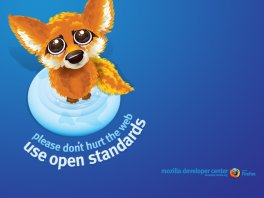I got into work this morning to find my desk’s keyboard and KVM switch non-responsive. The only way to reset the switch was to turn it off and back on, which meant disconnecting all the keyboard and mouse cables. (A KVM switch doesn’t need much power, so many of them just draw power from the computer, the same way an actual keyboard or mouse would.) It switched immediately to the Linux box, which was happily displaying its screen saver, so I switched back to the Windows box where it had been… and it got stuck again.
OK, so the Windows box had crashed. It’s been doing that lately, though usually I actually get a blue screen with the dreaded IRQL_NOT_LESS_THAN_OR_EQUAL, which could mean anything from a driver conflict to failing hardware. I haven’t taken the time to track it down, but maybe I should. I rebooted the Windows box, which seems fine for the moment, though there’s no sign of the crash—or even my forced reboot—in the system log.
Then I switched over to the Linux box, and the mouse wasn’t responding. When the mouse gets messed up, sometimes it’s enough to switch out of X into text mode and back. No luck. Sometimes closing X entirely and starting it again is enough. Not this time. I actually had to reboot the Linux box to get my mouse back. That really annoyed me.
So here are three things that went wrong.
- The Windows box crashed. This is probably a driver or hardware problem.
- The KVM switch got stuck. This should not be possible. Even if it’s getting confusing signals from one set of ports, it should be able to switch to another port.
- The Linux box (Fedora Core 4) could not recover from having the mouse unplugged for 10 seconds. There should be an easy way to tell it to check for the mouse again.
It’s #2 and #3 that bug me the most. Maybe it’s the man-bites-dog effect (I expect Windows to crash and/or require frequent reboots, so it’s more annoying when Linux does it), or maybe it’s just the fact that they’re simple error-recovery issues. I mean, seriously, unplugging the mouse for a few seconds makes it unusable?
Update: I forgot to check the second Windows box on the switch. It also had stopped responding to the mouse even after I reset the KVM switch. I’m beginning to think that problem #3 was in the switch itself, not the Linux mouse driver, since the non-crashed Windows box had the exact same problem.
